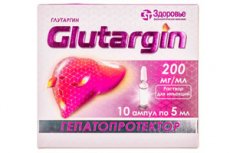該文的醫學專家
新出版物
谷氨酰胺
最近審查:04.07.2025

谷胱甘肽是一种保肝剂,旨在保护和维持肝功能。谷胱甘肽的主要活性成分是精氨酸谷氨酸。
精氨酸谷氨酸是由两种氨基酸组成的:精氨酸和谷氨酸。这两种物质在人体中都发挥着重要作用。精氨酸有助于清除肝脏中的毒素,改善血液供应,并加速肝细胞的再生。而谷氨酸又是许多代谢过程(包括肝脏代谢过程)的重要组成部分。
谷胱甘肽常用于预防和治疗各种肝脏疾病,例如脂肪变性、肝炎、肝硬化等。它有助于改善肝脏代谢,降低毒性水平,促进肝脏恢复并保护肝脏免受有害因素的侵害。
適應症 谷氨酰胺
- 脂肪肝疾病(脂肪变性)。
- 各种病因的慢性和急性肝炎。
- 肝硬化。
- 酒精、药物、化学物质和其他因素造成的毒性肝损害。
- 肠道菌群失调的预防和治疗。
- 手术和放射治疗后的肝脏修复。
發布表單
谷氨酸钠通常以静脉注射溶液的形式生产。它可以装在各种尺寸的安瓿瓶或小瓶中,通常精氨酸谷氨酸盐浓度为100毫克/毫升或500毫克/毫升。
藥效學
- 氨基酸代谢物:精氨酸谷氨酸是参与体内各种代谢过程的代谢物,在氨基酸代谢、能量代谢等代谢途径中发挥重要作用。
- 肝脏支持:谷胱甘肽通过其复杂的作用帮助保护和恢复肝功能。它有助于减少炎症,刺激肝细胞再生,并保护肝细胞免受损伤。
- 抗氧化作用:精氨酸谷氨酸具有抗氧化特性,有助于中和自由基并保护肝细胞免受由各种有毒物质或病理引起的氧化应激。
- 刺激氨基酸代谢:谷胱甘肽可能有助于改善肝脏中的氨基酸代谢,进而可能增加蛋白质合成并改善整体肝脏健康。
- 改善代谢功能:使用谷精可能有助于改善肝脏的代谢功能,包括脂肪、碳水化合物和其他营养物质的加工和利用。
- 防止毒性影响:谷胱甘肽可以帮助保护肝脏免受酒精、药物、重金属和其他物质等各种毒性影响。
藥代動力學
- 吸收:精氨酸谷氨酸口服后一般能很好地从胃肠道吸收。由于其分子量低,它能快速、轻松地穿透肠壁。
- 分布:精氨酸谷氨酸吸收后,通过血液分布到全身。它能够穿透血脑屏障,在细胞和组织中发挥预期的作用。
- 代谢:精氨酸谷氨酸在体内可通过水解、氧化、酰胺化等多种代谢途径代谢,形成代谢产物,经肾脏或胆管排出体外。
- 排泄:大多数精氨酸谷氨酸代谢物通过肾脏随尿液或胆道随粪便排出体外。
劑量和管理
保肝药物谷精肽(Glutargin)含有谷氨酸精氨酸,通常用于静脉注射。剂量可根据患者病情、疾病特征和医生建议而有所不同。通常建议每日使用5-20毫升谷精肽溶液,以静脉缓慢滴注的方式给药。
确切的剂量和治疗方案应由医生根据患者的临床表现和特征单独确定。
在懷孕期間使用 谷氨酰胺
谷精氨酸(Glutargine)含有精氨酸谷氨酸盐,一般不建议在孕期服用,除非咨询医生。关于其在孕期的安全性信息可能有限,而且对婴儿的潜在风险可能还不清楚。
禁忌
- 已知过敏:已知对精氨酸谷氨酸或该药物的其他成分过敏的患者应避免使用。
- 严重肾功能不全和肝功能不全:严重肾功能不全和肝功能不全的患者可能禁用谷胱甘肽,因为这可能会导致药物在体内蓄积并使病情恶化。
- 氨基酸代谢紊乱:患有罕见遗传性氨基酸代谢紊乱(如精氨酸谷氨酸)的患者可能禁用谷氨酸,并需要在医生监督下谨慎使用。
- 怀孕和哺乳:关于 Glutargin 在怀孕和哺乳期间的安全性的信息有限,因此使用时需要咨询医生。
- 儿童和青少年:关于 Glutargin 对儿童和青少年的安全性和有效性的数据可能有限,因此对这类患者使用该药物需要特别谨慎和医疗监督。
副作用 谷氨酰胺
- 罕见的是,对药物成分过敏的个体会出现瘙痒、皮疹、皮肤发红甚至过敏性休克等过敏反应。
- 在极少数情况下,可能会出现消化不良症(呕吐、腹泻、恶心、腹痛)。
- 口中可能会出现令人不愉快的味道。
- 一些尿素循环酶绝对缺乏的患者血铵水平升高(高氨血症)。
- 使用高剂量时可能会出现高氮血症。
- 胃中的酸度可能会增加。
- 罕见的是,可能会发生造血疾病。
過量
- 胃肠道疾病:可能会出现腹泻、恶心、呕吐、腹胀或腹痛。
- 电解质失衡:过量服用氨基酸补充剂会导致体内电解质失衡,尤其是在钠或钾摄入量较高的情况下。
- 血氨升高:精氨酸谷氨酸可能会升高血氨水平,尤其是在存在氨基酸代谢或肝功能障碍的情况下。
- 酸碱失衡:身体的酸碱平衡可能会发生紊乱。
- 过敏反应:有些人可能会对氨基酸产生过敏反应,包括皮疹、瘙痒、肿胀或过敏性休克。
與其他藥物的相互作用
由于缺乏显著的相互作用数据,保肝药谷精与其他药物的相互作用可能有限。然而,鉴于谷精含有精氨酸谷氨酸(一种天然氨基酸化合物),相互作用可能微乎其微。
儲存條件
通常,包括谷精在内的保肝药物应储存于室温(15°C 至 25°C)干燥处,避免阳光直射和潮湿。储存条件可能因具体制造商和药物释放方式而略有不同,因此建议参考使用说明书或包装上关于谷精储存的具体信息。
注意!
為了簡化對信息的理解,本指令使用了藥物 "谷氨酰胺",並根據藥物的醫療用途官方說明。 使用前請閱讀直接用於藥物的註釋。
描述僅供參考,不適用於自我修復指導。 這種藥物的需求,治療方案的目的,藥物的方法和劑量僅由主治醫師確定。 自我藥療對你的健康有危害。


